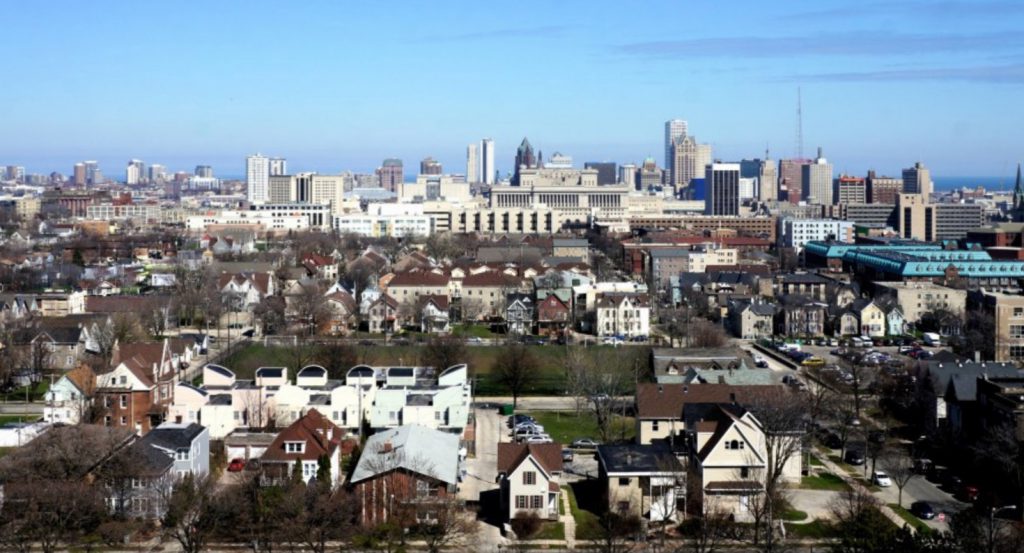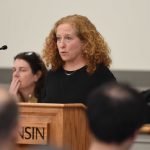Community Should Decide How $400 Million Spent
That’s how much federal pandemic aid city is getting. A participatory budget process is needed.

Milwaukee Skyline. File photo by Adam Carr/NNS.
The pandemic is still here, even if there’s talk of going back to “normal.” Black and brown folks in Milwaukee have never had a satisfactory “normal.” We don’t want to go backwards — we want real change, real accountability and investment.
Through the American Recovery Plan Act, or ARPA, the federal government is sending nearly $400 million in funds to Milwaukee over the next two years to help relieve the impact of the pandemic. Half of those funds just arrived in our city.
In order for that to happen, we need a truly participatory budgeting process that gives people the power to make real collective decisions on where and how funds should be spent.
We cannot be committed to equity if we are not honest about how the usual decisions have furthered the wealth, health and opportunity gaps within a majority Black and brown city.
Black and brown folks should be valued.
My neighbors in Metcalfe Park have testified at hearings online and in person, e-mailed leaders, called their officials and attended multiple input sessions. They are demanding real decision-making power with real dollars to support their solutions.
Community members are the experts. They know what they need.
In fact, Black folks are natural experts of participatory budgeting. Historically, we have had to survive with little to nothing, no access to opportunities and no real investment. So, we’ve learned to prioritize what’s important.
Since the beginning of the pandemic in Milwaukee, we have seen the community step up and provide access to food, health, mutual aid, housing and more, with minimal to no support from our city, and city-allocated resources. We have been on the front lines.
Patrice Gransberry, a community member in Metcalfe Park, recently told me in conversation:
Melody, if we decide we want to have a community barbeque, and we all collectively write out a list of what we need, then everyone signs up to contribute what they can, that’s participatory budgeting, Right?
In other words, we know how to identify an issue, see what we have collectively and solve the problem. Imagine what we could do with ARPA dollars.
Our community needs real investment, not just statements claiming that we are valued, but action that shows real value. We should be the ones determining how dollars are spent in a way that ensures that our community thrives, because Metcalfe Park and our surrounding communities have endured constant oppressive conditions in Milwaukee, and these were heightened due to this pandemic.
As a city with a majority Black and brown population struggling with wealth, health and housing disparities, we need to put the following into action:
1. None of these funds will be spent until a clear community-led process is created.
2. Create a participatory budgeting trust with a budget of $200 million — $100 million for each round of ARPA dollars. This money should be distributed among each aldermanic district, with more funding to marginalized districts, to allow residents in each district to have decision-making power on how the large influx of money should be spent. Through this participatory process, residents along with their alderperson would propose how funds should be invested, and residents would vote. This would ensure that communities have real decision-making power on what their neighborhoods need. There are over 650 examples of participatory budgeting in the United States, including Seattle, New York City, Chicago and Durham.
3. The Milwaukee Police Department receives $0 in funding. The MPD budget currently exceeds $295 million and the MPD received $9.8 million in CARES Act funding during the city budget process last year. Our community has been vocal in demanding that the police are defunded in order to prioritize investments in essential community needs.
4. Provide housing assistance, including rent, mortgage, utilities deferment or cancelation, long-term eviction moratoriums and direct funds to invest in community-led housing initiatives and community land trusts.
5. Direct funds to support youth-led organizations that support our youth with access to mentorship, jobs, internships, positive youth development programs and more. Direct funds to support artist and art groups, and recreation spaces in the community.
6. Direct funds to support preventative care, health and well-being of our community that creates real access to health care, mental health response teams, preventative health services and the COVID-19 vaccine. Direct funding to support community-based mutual aid groups.
Melody McCurtis is the deputy director of priorities and organizer at Metcalfe Park Community Bridges.
OPINION: Our community should decide how $400 million in COVID recovery money is spent. Period. was originally published by Milwaukee Neighborhood News Service.
Op-Ed
-
Wisconsin Candidates Decry Money in Politics, Plan to Raise Tons of It
 Dec 15th, 2025 by Ruth Conniff
Dec 15th, 2025 by Ruth Conniff
-
Trump Left Contraceptives to Rot; Women Pay the Price
 Dec 8th, 2025 by Dr. Shefaali Sharma
Dec 8th, 2025 by Dr. Shefaali Sharma
-
Why the Common Council’s Amended Budget is Good Policy for Milwaukee
 Nov 20th, 2025 by Alds. Marina Dimitrijevic and Russell W. Stamper, II
Nov 20th, 2025 by Alds. Marina Dimitrijevic and Russell W. Stamper, II





















